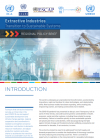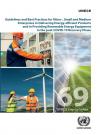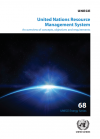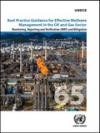Publications
Displaying Results 21 - 40 of 103
- English
The COVID-19 pandemic has presented an abrupt, even if temporary, halt to some of these trends, and underscored systemic vulnerabilities in health, economic, social and other systems, including those related to energy and industry. Failure to transition quickly to more sustainable systems will perpetuate these vulnerabilities, while also jeopardizing the fight against climate change and
- English
The world’s energy sector is undergoing a profound transition. This transition is driven by the need to expand access to clean energy in support of socio-economic development, especially in emerging economies, while at the same time limiting the impacts of climate change, pollution and other unfolding global environmental crises. Fundamentally this transition requires a shift from the use of
- Pусский
- Français
- English
Micro-, small and medium enterprises (MSME) are prominent in sectors affected by the COVID-19 pandemic. MSME in the energy efficiency and renewable energy sectors were implementing innovative, circular, green and sustainable initiatives before the onset of the COVID-19 pandemic, so they are well-placed to contribute to the post-COVID-19 recovery. However, on both the supply and demand sides MSME
- English
The multifaceted requirements of sustainable development are primarily dependent on the optimal and responsible use of natural resources. A new paradigm of optimising resource efficiency and progressing towards a circular economy is required to realise the need for balanced development of natural resources. The United Nations Resource Management System (UNRMS) is being designed as a unifying
- English
Promoting Energy Efficiency Standards and Technologies to Enhance Energy Efficiency in BuildingsECE Energy Series No. 60Geneva, 2020Buildings today are responsible for approximately one third of total final energy consumption and account for almost 40 percent of carbon dioxide emissions. Advanced technical solutions
- Français
- English
- English
The Best Practice Guidance for Effective Methane Recovery and Use from Abandoned Coal Mines (BPG on AMM) is aimed at raising awareness
- English
The Best Practice Guidance for Effective Methane Recovery and Use from Abandoned Coal Mines (BPG on AMM) is aimed at raising
- English
The document provides guidance for developing and implementing effective practices for monitoring, reporting and verifying (MRV) methane emissions from the oil and gas sector. It also provides guidance on remediation practices. The document is meant to serve as a resource for a broad audience, including owners and operators of oil and gas facilities and policymakers at all levels of government.
- English
ECE Energy Series 58: Application of UNFC Case Studies 2019 (ECE ENERGY SERIES No. 58) (2019)
(ECE/ENERGY/109)
This publication provides a series of case studies on various resource projects, including niobium, oil & gas, rare earth elements, thorium and uranium, from different countries
- English
- English
Redesigning the Uranium Resource Pathway: Application of the United Nations Framework Classification for Resources for Planning and Implementing Sustainable Uranium Projects (ECE ENERGY SERIES No. 57) (August 2019)
The adoption of the Sustainable Development Goals (SDGs) has made it essential to have a ground-up review of all
- English
- English
Guidelines for Application of the United Nations Framework Classification for Resources (UNFC) to Uranium and Thorium Resources (ECE ENERGY SERIES No. 55) (December 2017)This publication provides non-mandatory guidance for the application of the United Nations Framework Classification for Resources (UNFC) to uranium and thorium resources.
- English
Application of UNFC to Geothermal Energy Resources - Selected Case Studies (ECE ENERGY SERIES No. 51) (December 2017) ECE/ENERGY/110
*** Also available in French,
- English
- English
The UNECE Group of Experts on Coal Mine Methane (CMM) has released the second edition of the Best Practice Guidance for Effective Methane Drainage and Use in Coal Mines. Since the first edition was published in 2010, the industry practice and regulations have evolved, and this second edition captures the most critical developments. The second













